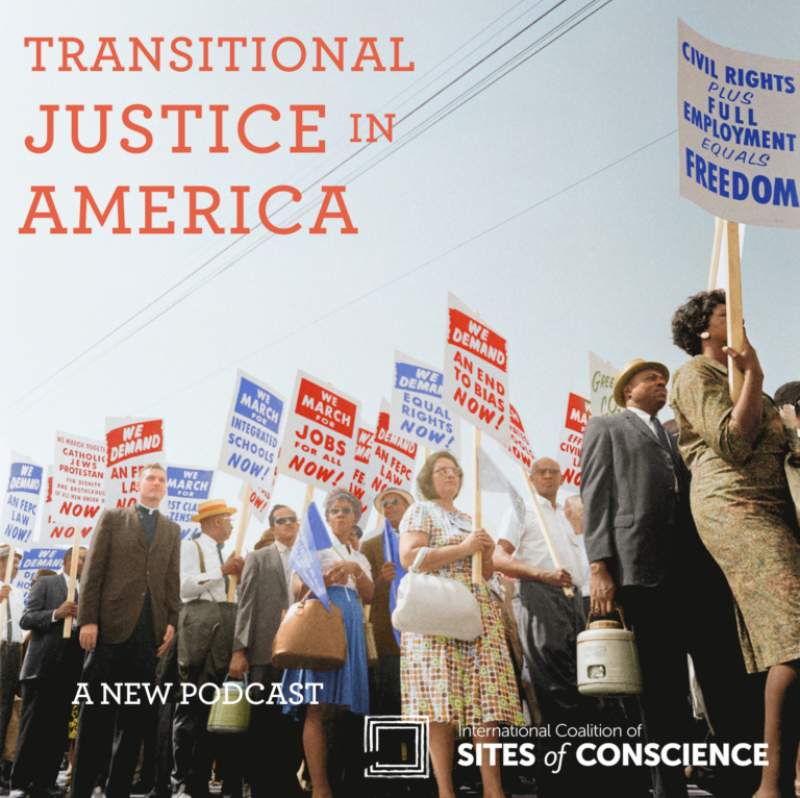
Over 400 years after the first enslaved African set foot in Virginia, the United States has yet to establish any formal mechanism to address the legacies of systemic racism in the country. These measures – generally known as “transitional justice” processes – can include formal criminal prosecutions, truth commissions, reparations programs, as well as various kinds of institutional reforms, and have been implemented in countries around the world from South Africa and Bosnia to Colombia.
To spark action on transitional justice in America, ICSC produced Transitional Justice in America, a six-episode podcast series that raises awareness of how these processes can help the United States correct course and foster healing.
As trusted entities in their communities, Sites of Conscience can play an integral role in providing opportunities for communities to discuss issues around truth, justice, and reconciliation. The podcast features conversations between three U.S.-based Sites of Conscience focusing on restorative history and racial justice with Sites of Conscience members in Colombia, The Gambia, South Africa, and Sri Lanka – all countries that have or are currently undergoing transitional justice processes. Among the many topics explored are intergenerational trauma, the role of communities in fostering change, and how any future processes can ensure that the needs of everyday people affected by systemic racism are addressed.
Episode 1: Transitional Justice for Black Americans
What is transitional justice? And what is the state of transitional justice in America? To kick off this series, we interview Jamira Burley, a social justice activist working at the intersection of community policy and social impact. We discuss justice, harm reduction, healing for Black Americans, and what America can learn from transitional justice initiatives around the world.
Episode 2: Healing and Shared Humanity
How can we find our common humanity in the wake of conflict and violence? In this episode, we interview Adriana Serrano Murcia, Coordinator for The Memory, Peace and Reconciliation Center of Bogotá in Colombia. Colombia is one of the first countries in the world to have formally recognized LGBTQ communities as part of a transitional justice process, and Adriana discusses how this came to be as well as the work she and others are doing to help former militants connect back to society through creative writing.
Episode 3: Memory’s Impact on the Present
The past – history, remembrance, and memory – doesn’t exist in a vacuum. It continues to affect each of us in the present in so many ways. In this episode, Radhika Hettiarachchi and Ana Edwards discuss historical memory and reclaiming spaces, as they make connections to both their work. Radhika is a researcher, curator, and development practitioner based in Sri Lanka. She is also the Founder of Herstories, a virtual Site of Conscience that has collected over 280 personal narratives of mothers from the north, south and east of Sri Lanka. Ana is chair of the Sacred Ground Historical Reclamation Project in Richmond, Virginia. Sacred Ground is a social justice organization that has worked for 8 years to help reclaim Richmond’s African Burial Ground.
Episode 4: Speaking Up for Health and Gender Justice
Sexual and gender-based violence is a public health crisis. Racism is a public health crisis. What steps can we take to begin dismantling health and gender inequity and heal from its effects? In this episode, Fatou Baldeh discusses her work in The Gambia with women who suffered violence and abuse under the Jammeh regime. Dr. Amber Johnson, creator of The Justice Fleet, relates that to their own work, which addresses racism and public health inequities in the US.
Episode 5: Truth and the Ongoing Process of Reckoning
Transitional justice is a continuous process. Even where there have been formal truth commissions, more work needs to be done. In this episode, Lebogang Marishane of Constitution Hill in South Africa discusses the ongoing truth and reconciliation efforts post-Apartheid. Farah Tanis, founder of the Museum of Women’s Resistance, makes connections to her work seeking truth and justice for Black women in America.
Episode 6: Transitional Justice in Practice: Lessons for Change-Makers
So far in this series, you’ve heard US-based transitional justice practitioners dialogue with fellow activists in Colombia, The Gambia, South Africa, and Sri Lanka. Common themes emerged from these conversations, and in this episode, we discuss these ideas and how you can apply transitional justice ideas to your own work. Tune in for a practical yet inspiring conversation on everyday activism, safe spaces, the power of storytelling, the role of technology, and the future of transitional justice work.
In collaboration with Better Lemon Creative Audio.
